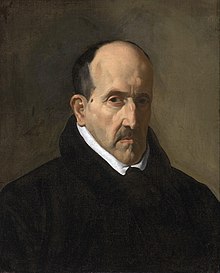Luis de Góngora y Argote
| Luis de Góngora y Argote | |
|---|---|

Luis de Góngora, in a portrait by Diego Velázquez.
|
|
| Born | 11 July 1561 Córdoba, Spain |
| Died | 24 May 1627 (aged 65) Córdoba, Spain |
| Occupation | Poet, cleric |
| Literary movement | culteranismo |
Luis de Góngora y Argote (born Luis de Argote y Góngora) (Spanish pronunciation: [lwiz ðe ˈɣoŋɡoɾa]; 11 July 1561 – 24 May 1627) was a Spanish Baroque lyric poet. Góngora and his lifelong rival, Francisco de Quevedo, are widely considered the most prominent Spanish poets of all time. His style is characterized by what was called culteranismo, also known as Gongorism (Gongorismo). This style existed in stark contrast to Quevedo's conceptismo.
Gongora was born to a noble family in Córdoba, where his father, Francisco de Argote, was corregidor, or judge. In a Spanish era when purity of Christian lineage (limpieza de sangre) was needed to gain access to education or official appointments, he adopted the surname of his mother, Leonor de Góngora. His uncle, Don Franscisco, a prebendary of Córdoba Cathedral, renounced his post in favor of his nephew, who took deacon's orders in 1586.
As a canon associated with this Cathedral, he traveled on diverse commissions to Navarre, Andalusia and Castile. The cities that he visited included Madrid, Salamanca, Granada, Jaén, and Toledo. Around 1605, he was ordained priest, and afterwards lived at Valladolid and Madrid.
While his circle of admirers grew, patrons were grudging in their admiration. Ultimately, in 1617 through the influence of the Duke of Lerma, he was appointed honorary chaplain to King Philip III of Spain, but did not enjoy the honor long.
...
Wikipedia
